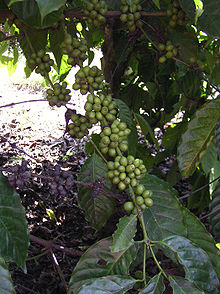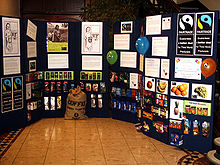| Revision as of 12:41, 24 March 2006 edit80.38.226.167 (talk)No edit summary← Previous edit | Revision as of 12:53, 24 March 2006 edit undo130.209.6.40 (talk) →BackgroundNext edit → | ||
| Line 4: | Line 4: | ||
| ==Background== | ==Background== | ||
| ]|A Fairtrade display of part of the range of products]]The labelling of fair trade products began at the initiative of Mexican ] farmers in 1988, together with ] ] ]. Coffee imported to the ] under fair trade principles was labelled by ] under the name of ]. This fair trade labelling system is today known as "Fairtrade" or "Fair Trade Certified", includes the ] and ] labels, and is governed by Fairtrade Labelling Organizations International (FLO). | ]The labelling of fair trade products began at the initiative of Mexican ] farmers in 1988, together with ] ] ]. Coffee imported to the ] under fair trade principles was labelled by ] under the name of ]. This fair trade labelling system is today known as "Fairtrade" or "Fair Trade Certified", includes the ] and ] labels, and is governed by Fairtrade Labelling Organizations International (FLO). | ||
| Although beginning with coffee, the FLO Fairtrade certification system covers a growing range of products, including ]s, ], ]s, ], ], dried and fresh ]s and ]s, ]s, ]s and ] ]s, ], ], ]s, ], ] and ]. ]] | Although beginning with coffee, the FLO Fairtrade certification system covers a growing range of products, including ]s, ], ]s, ], ], dried and fresh ]s and ]s, ]s, ]s and ] ]s, ], ], ]s, ], ] and ]. ]] | ||
Revision as of 12:53, 24 March 2006
- For other uses of "fair trade", see fair trade.

Fairtrade labelling (usually simply fairtrade, fair trade, Fair Trade or fair trade certified) is a brand designed to allow consumers to identify goods (especially agricultural products such as coffee) which meet agreed standards. The system involves independent auditing of producers to ensure standards are met. Companies offering products that meet the fair trade standards are licensed to use the fair trade label.
Background

The labelling of fair trade products began at the initiative of Mexican coffee farmers in 1988, together with Dutch development agency Solidaridad. Coffee imported to the Netherlands under fair trade principles was labelled by Solidaridad under the name of Max Havelaar. This fair trade labelling system is today known as "Fairtrade" or "Fair Trade Certified", includes the Max Havelaar and TransFair labels, and is governed by Fairtrade Labelling Organizations International (FLO). Although beginning with coffee, the FLO Fairtrade certification system covers a growing range of products, including bananas, honey, oranges, cocoa, cotton, dried and fresh fruits and vegetables, juices, nuts and oil seeds, quinoa, rice, spices, sugar, tea and wine.
Standards are set by the FLO on behalf of a number of national bodies (such as the Fairtrade Foundation in the UK) for each type of product. Typically standards cover labor standards, environmental standards, and stable pricing. A common feature is for standards to set a long-term minimum price (typically considerably above the long-run average market rate) based on the incomes needed to sustain the small farmers products should be sourced from (often via co-operatives). They may include an additional "social premium" above the market price designed specifically to support community projects such as schools. Products that are certified to meet the standard may for a fee display the appropriate Fairtrade symbol on their packaging. (The fee supports the work of the national monitoring body.) Although originally each country had its own Fairtrade symbol, an international standard has been agreed which is slowly being adopted.
There are currently national certification and standards bodies in 19 countries, as well as an international organization (Fairtrade Labelling Organizations International, FLO) to coordinate policy. FLO exists to promote products which are produced and sold in accordance with its definition of fair trade, called the FINE definition. FLO holds the trademark to the Fairtrade™ label in Europe, while the Fair Trade Certified™ label is trademarked by TransFair USA.
There are also other organizations and certifications which are not part of FLO, including Rugmark (carpets), Clean Clothes Campaign,Made-by (clothing) and Jambohut (handicraft). Major distributors of Fairtrade products today include, Dritte-Welt Partner, Traidcraft, and Cafedirect.
Progress
In 2004 there were around 400 certified producer organizations representing 800,000 families in 45 countries, and over 550 companies licensing the FLO Fairtrade label. The countries with highest spending per capita on Fairtrade-labelled goods are Switzerland and the Netherlands. Global sales are expected to reach $1bn by 2007. In the UK, the most significant single Fairtrade product is coffee, where Fairtrade brands have 18% of the roast and ground coffee market and 3% of all coffee sales.
Although Fairtrade products are typically somewhat higher-priced than equivalent non-Fairtrade goods, for many products (e.g. coffee, bananas) the difference is relatively small (as long as sufficient volumes are involved). This is because although a considerable premium may be paid to the producers (often 50-100% above market rate), this forms only a small part of the final product price (typically less than 10%); most of the price is determined by transport, distribution and other costs. (However, for some Fairtrade products such as toys, the producer cost is a considerably greater proportion of the total.)
Nestlé controversy
Partners Blend coffee, launched by Nestlé during 2005, has obtained Fairtrade labelling status, although this decision has been dismissed as a "Big Joke" by an unnamed Colombian trade union activist . Nestlé has been the subject of a consumer boycott campaign for a number of years due to their allegedly unethical business practices (see Nestlé boycott). Baby Milk Action, an organization campaigning to raise awareness of this boycott, have also issued a press release criticizing the decision to award Nestlé the Fairtrade mark .
See also
External links
- Fairtrade Labelling Organizations International (FLO): The coordinator of the Fairtrade labelling system
- In association with IFAT, NEWS! and EFTA (below), FLO forms the FINE group that defines fair trade criteria and defines accreditation schemes for fair trade organisations. For links to national initiatives of FLO, see above.
- Coffee that really helps development
- FLO-Cert Gmbh: The certification body for FLO Fairtrade labelled products
- International Fair Trade Association
- NEWS! Network of European Worldshops
- European Fair Trade Association
- http://www.surfindia.com/tradefairs/ - Indian Trade Fair Directory
- European Commission (1999), Communication from the Commission to the Council on "fair trade", COM(1999) 619 final, Brussels, 29.11.1999 (Uses a popup)
- Fairtrade NUS Campaign, a campaign for National Union of Students (NUS) unions to source 100% of their tea and coffee from brands accredited with the FAIRTRADE Mark.
- Article on Fair Trade Coffee
FLO members
Fairtrade Labelling Organizations International member organizations:
- TransFair Austria
- Max Havelaar Belgium
- TransFair Canada
- Max Havelaar France
- Max Havelaar Denmark
- TransFair Germany - origin of TransFair organisations
- Fairtrade Foundation UK
- TransFair Italy
- Fairtrade Marki Ireland
- TransFair Japan
- TransFair Minka Luxemburg
- Stichting Max Havelaar Netherlands - origin of Max Havelaar organisations
- Max Havelaar Norge
- Reilun kaupan edistämisyhdistys ry. (Finland)
- Föreningen för Rättvisemärkt (Sweden)
- Max Havelaar Stiftung Schweiz
- TransFair USA
- Comercio Justo México
- Fair Trade Association of Australia & New Zealand (Australia site)
- Fair Trade Association of Australia & New Zealand (New Zealand site)
- FLO Branch Office in El Salvador
- Asociación del Sello de Productos de Comercio Justo (Spain)